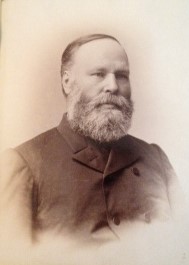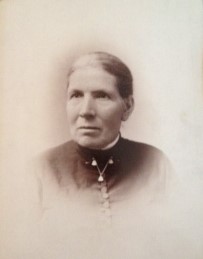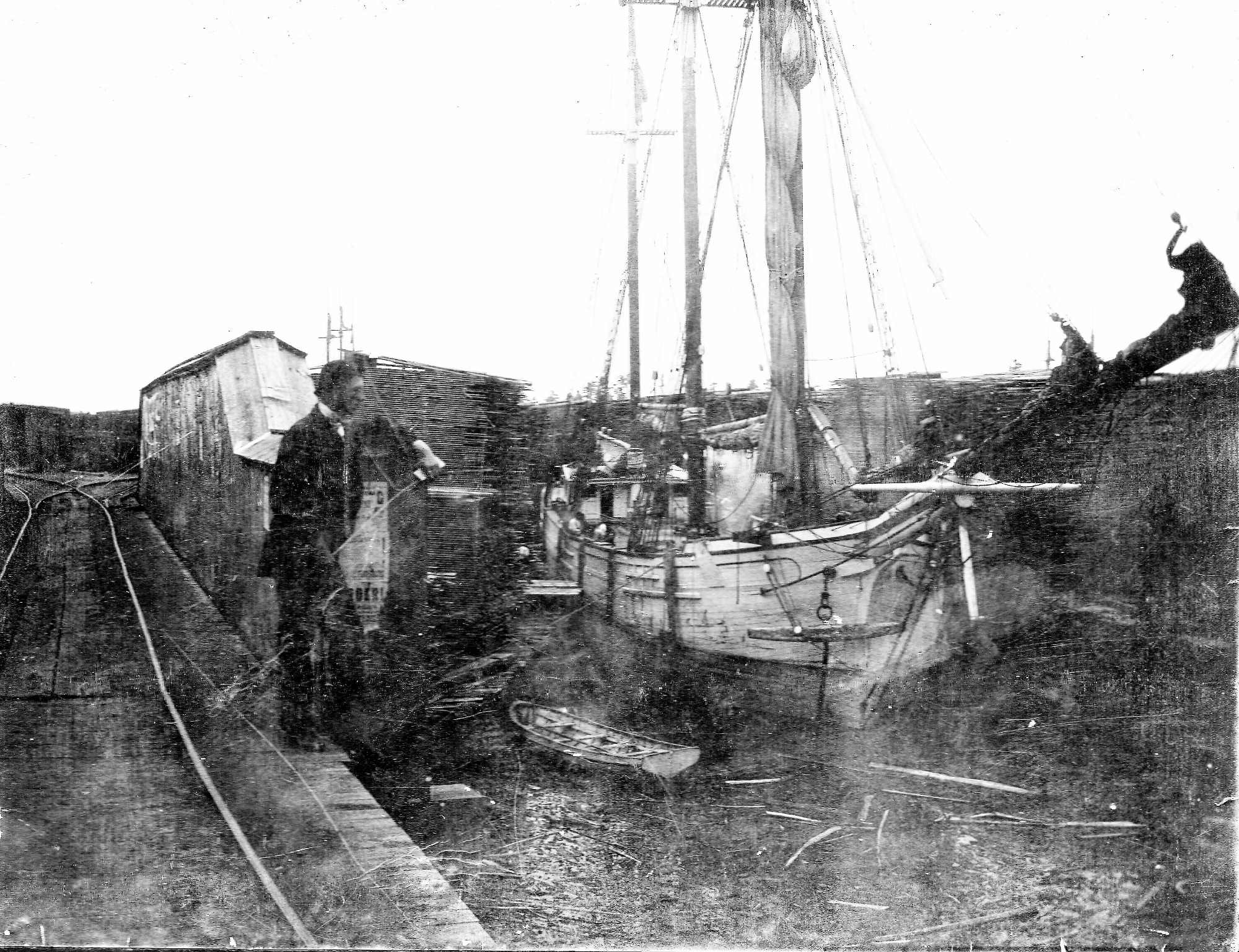
Capt. Henry Bundy (1826 – 1906), Photo
Courtesy Sue Baar
The sailor evangelist, Henry Bundy, was a frequent visitor to Manistique and other nearby ports. He preached both from the deck of his ship and from the pulpit of local churches. His arrival each summer was eagerly anticipated by the citizens of Manistique and Schoolcraft County
Henry Bundy was born in London, England in 1826 to impoverished parents. He was an incorrigible youth who roamed the city streets, refusing to engage in any schooling. By age 10, the boy was completely beyond his parents’ control. Not knowing what to do, they bound their rebellious son for seven years as an apprentice to the captain of the Abel Gower, a three-masted, 313 ton merchant ship.
Henry’s first voyage in 1836 on the Abel Gower took him around the Cape of Good Hope to the port of Bombay, India. Beset by calm winds, the voyage dragged on for weeks creating a shortage of drinking water and rationing. When young Henry was caught by his shipmates stealing water, his education as a seaman was begun. Though merely a boy, he was tied to the mast and lashed with a whip. Returning to London 14 months later, Henry’s next voyage took him to Quebec, Canada. During his long career as a sailor, Bundy visited ports in Europe, Asia, North and South America, and Australia. Bundy even served a two-year hitch in the British Navy.
By the late 1850s, Bundy was drawn to the American Great Lakes and the lure of profits that could be made in the wheat trade. In 1858, he sailed to Chicago, Illinois, and made that city his home. Bundy had no education as a child, so during the winter months he attended night classes and finally learned to read and write. In 1863 he met and married Margaret McCredie, an immigrant from Scotland, who became his devoted companion. Three children were born from this union, including Henry, Agnes and Maggie.

Margaret (McCredie) Bundy, Photo Courtesy
Sue Baar.
Bundy sailed on a number of Great Lakes merchant ships before being able to purchase his own vessel, the bark Potomac, which he sailed as captain. Bundy embodied the popular stereotype of the 19th Century sailor. He was powerfully built, and never backed away from a fight. His language was rough and profane. But everything changed in 1869, when Bundy underwent a religious conversion that left his friends amazed.
One afternoon, when the Potomac was tied up at the dock near Halstead Street in Chicago, a group of Methodist women asked to come aboard and hold religious services. Bundy reluctantly agreed. He loved singing and the Methodist hymns delighted him so much that he asked the women to return. Before long, Bundy was a believer.
After his conversion, Bundy felt a calling to spread the Gospel message to others. He began with the crew of his ship the Potomac, all nine of whom were converted to Christianity. Bundy soon gave up the merchant trade and dedicated his life to spreading the Word to sailors, fishermen and lumbermen who lived in isolated communities along the shores of the northern Great Lakes. The Potomac became a missionary ship, but was ill-suited for this purpose.
So, Bundy gave up sailing for a time and preached at the Mariner’s Hospital and to the sailors at the docks. He was less successful when he tried to preach from a wagon stand on the street corners in Chicago. When he began to speak, he was greeted with missiles of rotten eggs, spoiled potatoes and over-ripe fruit. Undeterred, Bundy soon won over the onlookers. They eventually came to respect him and stopped throwing food at him.
Bundy’s seafaring missionary life began in 1876 when he was endorsed by the Western Seamen’s Friend’s Society and given money to outfit a missionary vessel which Bundy called the Glad Tidings. Bundy’s family joined him in his ministry. His wife Margaret played hymns on the melodeon and his children eagerly passed the hat for offerings. Bundy was formally ordained an evangelist in June of 1878 at a ceremony in Chicago by the Western Seaman’s Friend Society.
Over the course of the final three decades of the 19th Century, Bundy captained four different Gospel ships. Each vessel was larger than its predecessor, and all were named the Glad Tidings. His last Gospel ship, built in 1889, was a steamship which enabled him to visit many more ports each season. The vessels were paid for by wealthy contributors who believed in his mission. The ship’s cargo included bibles printed in five different languages.

The above photo shows one of Bundy’s Gospel ships docked in the slips of Manistique Harbor – G. Leslie Bouschor Collection
Bundy visited Manistique nearly every summer during the late 1870s, 80s and 90s. Other nearby ports of call included Sac Bay, Fayette, Garden, Seul Choix, and St. Martin’s Island and Beaver Island.
Bundy’s visits were often chronicled in the pages of Manistique’s newspaper, the Pioneer. His arrival in July of 1883 was noted as follows: “Thursday the gospel ship, Glad Tidings, Capt. Bundy, came in and made fast to the pier just past the C. L. Co. mill. The captain is an old favorite here, having visited this place a number of times in his missionary work. Last fall he sold the craft in which he had sailed with his family for six years and during the winter built the new boat that he now sails. She is much larger and more substantially built than the other, giving more cabin room and certainly must be a better sea boat. The captain and wife informed our reporter that they were ‘at home’ and could find room for not less than one hundred people below deck should they want to attend services there. Capt. Bundy goes about doing good and is welcomed heartily at every port where he casts anchor. He will remain here until sometime next week. Call and look over the craft for ‘she is a beauty,’”
During his visits to Manistique he often held religious services on his boat, but at other times he spoke in town at the Union Hall or from the pulpit of local churches. In October of 1885, Bundy delivered his sermon at the Methodist church.
By 1895, Bundy’s advancing years and the escalating cost of maintaining the Gospel steamer prompted the captain to lay up his fourth Glad Tidings. The steamer was sold in April of 1896 to a buyer in St. Ignace for $3,900 and was renamed the Elva. From then on Bundy relied on public transportation to continue his ministry. In 1903 at age 77, Bundy was still preaching on the street corners. Poor health finally forced his retirement at age 79. Bundy’s beloved wife Margaret died on January 22, 1904 at the age of 76. The captain’s life ended two years later on September 15, 1906 at age 80.
